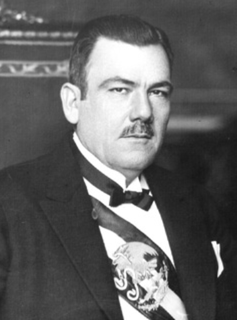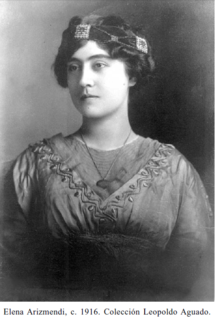This article needs additional citations for verification .(July 2011) |
El gesticulador (The Impostor) is a 1938 play by Mexican dramatist Rodolfo Usigli.
This article needs additional citations for verification .(July 2011) |
El gesticulador (The Impostor) is a 1938 play by Mexican dramatist Rodolfo Usigli.
The protagonist, César Rubio, is an unemployed professor who, in the aftermath of the Mexican Revolution, settles with his family in a small town in the north of Mexico. There, a professor from Harvard University confuses him for a missing revolutionary hero with the same name. Rubio claims to be the deceased hero, telling the professor that, disillusioned with the course of the Revolution, he had embraced anonymity until thirty years thereafter. The story is published in The New York Times , and Rubio comes to the attention of his compatriots, receiving accolades and fielding offers to run for the governorship of his state against a corrupt Revolutionary general. Rubio loses himself in his new identity, viewing it as an opportunity to renew the promise of the Revolution. Things go awry when the corrupt general against whom César is running forces a meeting between the two. In their conversation, each attempts to blackmail the other. Navarro, the corrupt general, knows that César is not the general he claims to be. César, on the other hand, figures out that Navarro killed general César Rubio during the war. Outside the door was César's son, who had trouble reconciling his father's newly revealed heroism. Despite Navarro's threats, César proceeds with his candidacy for governor. After leaving to attend the election, Miguel, Julia, and Elena (César's son, daughter, and wife, respectively) discuss the nature of their father's actions; Julia supports him, while Miguel, and ultimately Elena are unable to come to terms with his lie. However, Elena also realizes that Navarro will try to kill César, and sends Miguel to warn his father of the assassination. Unfortunately, he arrives too late; both César and the assassin have been killed, leaving no link back to Navarro. Navarro briefly returns to the house to gloat before addressing the crowd outside, promising that César will be treated as a hero and his family will be taken care of. While the crowd is initially hesitant, Navarro's apparent goodwill convinces them, and they cheer both him and César.
The play was daring for its time in that it used the true language of contemporary politics, a first for Mexican literature. [1] Originally published in the literary review El hijo pródigo in 1938, the play was not staged until 1947. Its debut in the Mexico City's Palacio de Bellas Artes was welcomed by the theater-going public, but was met with hostility by the Mexican government. At issue was the play's declaration of the death of the Mexican Revolution in its institutionalization in the Partido Revolucionario Institucional. [2]
The government cancelled several performances, and writers were hired to severely criticize the performances that were allowed to go on. The work thus became the only play in Mexican history to be censored by the government.

Francisco Ignacio Madero González was a Mexican revolutionary, writer and statesman who served as the 37th president of Mexico from 1911 until shortly before his assassination in 1913. A wealthy landowner, he was nonetheless an advocate for social justice and democracy. Madero was notable for challenging long-time President Porfirio Díaz for the presidency in 1910 and being instrumental in sparking the Mexican Revolution.

José de la Cruz Porfirio Díaz Mori was a Mexican general and politician who served seven terms as President of Mexico, a total of 31 years, from 28 November 1876 to 6 December 1876, 17 February 1877 to 1 December 1880 and from 1 December 1884 to 25 May 1911. The entire period from 1876 to 1911 is often referred to as the Porfiriato.

Lázaro Cárdenas del Río was a Mexican soldier and politician. He was a general in the Constitutionalist Army during the Mexican Revolution and a statesman who served as President of Mexico between 1934 and 1940. He is best known for nationalization of the oil industry in 1938 and the creation of Pemex, the government oil company. He also revived agrarian reform in Mexico, expropriating large landed estates and distributing land to small holders in collective holdings (ejidos).

Cuauhtémoc Cárdenas Solórzano is a prominent Mexican politician. He is a former Head of Government of Mexico City and a founder of the Party of the Democratic Revolution. He ran for the presidency of Mexico three times. His 1988 loss to the Institutional Revolutionary Party candidate Carlos Salinas de Gortari had long been considered a direct result of obvious electoral fraud, later acknowledged by President Miguel de la Madrid. He previously served as a Senator, having been elected in 1976 to represent the state of Michoacán and also as the Governor of Michoacán from 1980 to 1986.

José Venustiano Carranza De La Garza was one of the main leaders of the Mexican Revolution, whose victorious northern revolutionary Constitutionalist Army defeated the counter-revolutionary regime of Victoriano Huerta and then defeated fellow revolutionaries after Huerta's ouster. He secured power in Mexico, serving as head of state from 1914 to 1916. With the promulgation of a new revolutionary Mexican Constitution of 1917, he was elected president, serving from 1916 to 1920.
Rodolfo Usigli was a Mexican playwright, essayist and diplomat. He has been called "the father of Mexican theater" and "playwright of the Mexican Revolution." In recognition of his work to articulate a national identity for Mexican theater, he was award the Premio Nacional de Ciencias y Artes in 1972.

Adolfo López Mateos was a Mexican politician who became a member of the Institutional Revolutionary Party (PRI), after earlier opposing its precursor in 1929. He was elected President of Mexico, serving from 1958 to 1964.

Álvaro Obregón Salido was a general in the Mexican Revolution, who became the 46th President of Mexico from 1920 to 1924. He supported Sonora's decision to follow Governor of Coahuila Venustiano Carranza as leader of a revolution against the Victoriano Huerta regime. Carranza appointed Obregón commander of the revolutionary forces in northwestern Mexico and in 1915 appointed him as his minister of war. In 1920, Obregón launched a revolt against Carranza, in which Carranza was assassinated. Obregón won the subsequent election with overwhelming support.

Plutarco Elías Calles was a Mexican military general and politician, and a freemason. He was the powerful interior minister under President Álvaro Obregón, who chose Calles as his successor, he was violently anticlerical and fought against the Catholic Church. The 1924 Calles presidential campaign was the first populist presidential campaign in Mexico's history, as he called for land redistribution and promised equal justice, more education, additional labour rights, and democratic governance. After Calles' populist phase (1924–1926) he ushered in a state atheism phase (1926–1928), ushering a period of persecution against Catholics. After leaving office he continued to be the dominant leader from 1928 to 1935, a period known as the Maximato, after a title Calles awarded to himself, Jefe Máximo of the Revolution. Calles is most noted for his implementation of anti-Catholic laws in the Mexican constitution. This led to the Cristero War, a civil war involving Catholics opposed to the administration. Calles also founded the Institutional Revolutionary Party in 1929. The party had ensured political stability in the wake of the assassination of president-elect Alvaro Obregón in 1928. In its two subsequent incarnations, it held power continuously from 1929 to 2000.

Miguel Alemán Valdés was a Mexican politician who served a full term as the President of Mexico from 1946 to 1952, the first civilian president after a string of revolutionary generals. His administration was characterized by Mexico's rapid industrialization, often called the Mexican Miracle, but also for a high level of personal enrichment for himself and his associates. His presidency was the first of a new generation of Mexican leaders, who had not directly participated in the Mexican Revolution, and many in his cabinet were also young, university-educated civilians, close friends from his days at university.

Mexican literature is one of the most prolific and influential of Spanish-language literatures along with those of Spain and Argentina. It has internationally recognized authors such as Octavio Paz, Alfonso Reyes, Carlos Fuentes, Sergio Pitol, José Emilio Pacheco, Elena Poniatowska, Fernando del Paso, Juan Rulfo, Amado Nervo, Juana Inés de la Cruz, Carlos de Sigüenza y Góngora, and several others.

El derecho de nacer is a Mexican telenovela produced by Ernesto Alonso for Televisa in 1981. Based on the Cuban radionovela of the same name written by Félix B. Caignet adapted for TV by Fernanda Villeli and directed by Raúl Araiza.

Pascual Ortiz Rubio was a Mexican politician and the President of Mexico from 1930 to 1932. He was one of three Mexican presidents to serve out the six-year term (1928–1934) of assassinated president-elect Álvaro Obregón, while former president Plutarco Elías Calles retained power in a period known as the Maximato. Calles was so blatantly in control of the government that Ortiz Rubio resigned the presidency in protest in September 1932.

The Maximato was a transitional period in the historical and political development of Mexico from 1928 to 1934. Named after former president Plutarco Elías Calles's sobriquet el Jefe Máximo, the Maximato was the period that Calles continued to exercise power and exert influence without holding the presidency. The six-year period was the term that President-elect Alvaro Obregón would have served if he had not been assassinated immediately after the July 1928 elections. There needed to be some kind of political solution to the presidential succession crisis. Calles could not hold the presidency again because of restrictions on re-election without an interval out of power, but he remained the dominant figure in Mexico.

Entre el Amor y el Odio is a Mexican telenovela produced by Salvador Mejía Alejandre for Televisa in 2002. It is based on the radionovela Cadena de odio by Hilda Morales de Allouis.

There is a Polish diaspora in Mexico. According to the 2005 intercensal estimate, there were 971 Polish citizens living in Mexico. Furthermore, by the estimate of the Jewish community, there may be as many as 15,000 descendants of Jewish migrants from Poland living in Mexico.

Senda de gloria is a Mexican telenovela produced by Ernesto Alonso for Televisa in 1987. The telenovela recreates historical events in Mexico between 1916 and 1939. It starred Eduardo Yáñez, Julieta Rosen, Ignacio López Tarso, Blanca Sánchez, Roxana Chávez and Anabel Ferreira.

Wings of the Hawk is a 1953 3-D American Western film directed by Budd Boetticher and starring Van Heflin and Julie Adams. It is set during the Mexican Revolution.

Elena Arizmendi Mejía was a Mexican feminist who established the Neutral White Cross organisation during the Mexican Revolution. She was a part of the first wave of Mexican feminism and established the "Mujeres de la raza" and the International League of Iberian and Latin American Women in co-operation with G. Sofía Villa de Buentello.
El vuelo del águila is a Mexican telenovela produced by Ernesto Alonso and Carlos Sotomayor for Televisa in 1994-1995. Telenovela based on the Mexican soldier and President of Mexico Porfirio Díaz, from his name had come out the title "Época Porfiriana" or "Porfiriato" during the period of his rule, in the years 1876-1911.